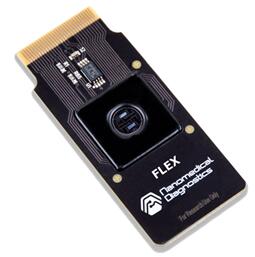Search This Supplers Products:laboratory equipmentcooperating overseas labsPaternity testNIPT testcreate a Y-database
New graphene biosensor FLEX accelerates protein determination
time2018/03/24
- Introduction: Nanos Diagnostics, the global leader in graphene biosensors, recently launched a new hydrophobic biosensor, FLEX, which can be combined with the company's Agile R100 unlabeled personal measurement system.
Intrinsic membrane proteins (IMPs) are not only difficult to extract from the cell membrane, but also have typical instability, which makes the study of IMP very challenging. The surface chemistry of biosensors often needs to be tailored to the unique requirements of each of the IMPs, so a large number of assay developments have to be performed. Graphene biosensors accelerate research and development of drugs and biotherapeutics. According to the consulting report of Nanos, Nanomedical Diagnostics, the world's leading manufacturer of graphene biosensors, recently introduced a new type of hydrophobic immobilized biosensor, FLEX, which can be combined with the company's Agile R100 unlabeled personal measurement system. This new biosensor accelerates surface chemical customization, which shortens the time required for IMP researchers to obtain reliable in vitro kinetic data.

New FLEX Agile R100 Biosensor
Ross Bundy, CEO of Nanomedical Diagnostics, explained: “FLEX biosensors provide a flat, highly consistent hydrophobic surface that quickly fixes the composition of the membrane, eliminating the need for time and reducing the number of error-prone connectors. Linker Chemistry: Because the FLEX biosensor eliminates the need for labeling and labeling steps, it eliminates a large amount of modification work and enables the direct determination of natural proteins, which allows for unprecedented flexibility in assays, as well as the immobilization of all proteins and membranes. Divided or fat monolayer 'super power'."
Combining this new biosensor with the Agile R100 kinetic characterization platform, which requires less samples and materials, the awards have become easy even for research in the face of trace amounts of target proteins. In the case of a combination of the two, the unprecedented consistency of the hydrophobic surface can increase the reliability of the data. At the same time, the elimination of labels or tags can greatly reduce the requirements of protein engineering, and therefore, the challenging IMPs can be made more natural. the study. Like all Agile R100 biosensors, FLEX chips are reproducible and cost-effective. The Agile R100's single-sample format allows researchers to apply samples directly to the sensor surface to reduce protein degradation during the process.
Ross Bundy added: “The new FLEX chip not only provides a convenient method for studying IMPs, but also accelerates the development of all cell-based assays including whole cell analysis. Its uniform hydrophobic surface has a suitable for whole cell growth. The conditions, therefore, do not require researchers to face challenging chemical studies in order to immobilize the target protein. Our goal is to make it easier for researchers to characterize the interactions required for the conversion of in vitro activity into in vivo efficacy.”
The Agile R100 is the world's first kinetic characterization platform built using proprietary field-effect biosensor (FEB) technology. Field-effect biosensor (FEB) technology is a breakthrough electronic technology that measures biomolecular interactions in real time. The easy-to-use, one-sample format provides economical, reliable, and informative data for all laboratories. It also provides a cost-effective way to verify target accuracy and improve drug discovery efficiency.
